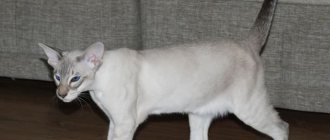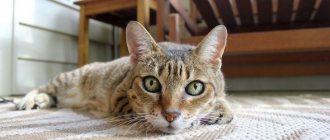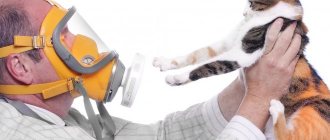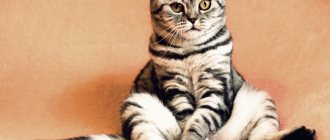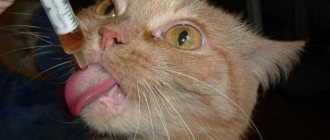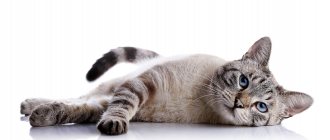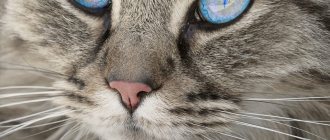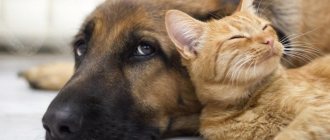Typical cat lover character
Cat lovers are introverts. The cat does not need to be walked, gathering in a group with other owners, sharing news and discussing the habits of pets. The space in the house is unobtrusively divided so that both the animal and its owner can always have privacy.
People who love cats value home comfort, cleanliness, order, and peace. They are “on their own”, often secretive, can be unpredictable and hysterical. Prone to loneliness. In relationships they are straightforward, honest and stubborn. But they are capable of sincere affection and love.
Cat people often turn out to be night owls; at night no one bothers them to focus on their feelings and relax. They do not like noise, although they prefer to live in the city. After all, in the city it is easier to protect your personal life from interference.
Another trait of cat people is the curiosity of an explorer. These are people who prefer to observe the behavior of an animal rather than control it. And studying the habits of cats is very interesting. They are independent and original. The furry predators have not lost any connection with nature, and every Murzik living in an apartment is essentially a small tiger.
Scientists prefer cats. It is believed that the level of intelligence of people who choose cats is higher than that of those who keep dogs.
If the character traits of a cat person are unbalanced, he can be withdrawn and neurotic, selfish and misanthropic.
And cat lovers are always careful in their movements and on alert, so as not to accidentally step on the tail or paw of a sneaking tiger cub.
Differences between cat people and dog people
Psychologists from the United States conducted a study on this topic and reported the results at the Association of Psychological Sciences conference in San Francisco.
600 students took part in the study: they filled out extensive questionnaires to identify their favorite qualities of animals and their own character traits, and passed a series of tests. Some conclusions only confirmed old stereotypes, but there are also something new.
It turned out that cat lovers were superior in intelligence to dog lovers. Partly because of the environment they most prefer, cat people scored higher on the intelligence test.
A tendency was identified that among cat lovers there are more people prone to nonconformism and introversion.
The differences between cat and dog owners and lovers are explained by the fact that people are sensitive to animals whose personality traits remind them of their own. For example, cat lovers highly value the independence of these animals. A dog, as you know, perceives its owner as a leader. A cat usually considers its owner to be a big, stupid cat, says biologist John Bradshaw from the University of Bristol. Convincing cats of this will be as difficult as convincing dog lovers that cat lovers are smarter! :)
Cat fans feel comfortable in silence, appreciate the opportunity to be alone, do what they love, and spend time usefully: perhaps reading a book, learning a foreign language.
And the need for contemplation in such people is like that of a “ cat in the window ”!
Cat lovers will prefer a dialogue with an interesting person or communication in a narrow circle of like-minded people to cheerful companies. That's why cat lovers have fewer friends than dog lovers. Dogs are “contactors”, and cats are observers, so it is not surprising that cat lovers, like their pets, prefer not to seek further contacts with strangers.
Cat people are less likely to display qualities associated with dominance. They also do not tolerate being managed well, preferring to be guided not by rules and hierarchy, but by expediency. Cat people generally find it difficult to endure living in the system, and therefore do not strive for recognition in society and high social status. This is not surprising: every cat owner can note its wayward character.
We can say that the character of people reflected the familiar ideas about the character of dogs and cats: the former are cheerful and thick-skinned, the latter are closed and capricious. More often than not, cats are models of independence and autonomy, and these traits, according to many, are markers of high intelligence and a propensity for success.
Everyone knows that cats can be quite prim. Their owners are also usually not so easy-going and cheerful. Researchers have found that cat lovers are more grumpy. They more often indicate in statuses that they are tired or irritated. While dog owners prefer to tell the world about their excitement and pride, they are more energetic, friendly, and by the way, dog owners are more fond of children (48%) than cat owners (30%).
Previously, in 2010, a similar study was already conducted, in which not students, but the adult population - 4,500 people - participated. And the results were similar: dog owners, compared to cat owners, were more sociable and more conscientious about following general rules.
It is clear that the point here is not so much in cats or dogs, but in the character of the people themselves: an extrovert will be drawn to dogs because their behavior corresponds to the style, the manner of communication that the extrovert likes; an introvert will like cats for the same reason.
How to characterize owners of both cats and dogs? Or fish lovers? Or “people lovers” who can’t stand animals or spirit?) Surely, there are already studies on these topics!
Author of the article Natalya Suntsova June 19, 2020
Typical character of a dog lover
Dog lovers are extroverted. They are more sociable than cat people, friendly and energetic. Are ready to move a lot, endure bad weather and dirt while walking. Come up with new activities and routes. They love to interact with people, influence them, but at the same time they themselves are influenced. They fit well into the team and follow the rules. Able to both lead and perform monotonous work.
These people are usually positive and resistant to stress. They love noisy parties. They have many friends and acquaintances. In general, dog lovers easily trust people, because of this they are often defenseless against lies and betrayal. They are more open and responsive than cat lovers. They prefer to spend time with young children and teenagers. And they are better at caring for the sick. These are usually family people who do not tolerate loneliness well, are devoted and caring.
If we talk about the negative qualities of dog lovers, then these are self-doubt and aggressiveness. Especially for those who have dogs of fighting breeds.
Transformation of love
When and how does this shift occur in human consciousness? When did a quiet, intelligent woman declare that the only ones worthy of love were these “fragrant” cats that scream at night as her “babies”? Why does she protect them from threats, fictional and real, without sparing her own health, as well as the health of her neighbors?
She is poor, lonely, and her relatives have already stopped all attempts to help her “live like a human being.” The neighbors, some out loud, some silently, pour out their “boiling” on her. Her communication is increasingly limited to sellers and cats. A sad story of a lonely life.
One or two cats in the house are funny living toys that require a certain amount of attention and care. But at what point are two cats not enough? Why do they begin to crowd out normal communication from life, to build a wall between “her” and society? When people around turn into “bloodthirsty enemies”, ready to destroy the idyll at any moment?
Photo: Andrean Lupine “Crazy Cat People”
The character of those who keep both cats and dogs
Often people are not so polarized in their preferences as to settle on one animal. Many people get cats and dogs at the same time. But, interestingly, if a person loves dogs, then the likelihood that he will also want to have a cat is higher than vice versa. A cat lover will most likely remain true to himself, since a dog can completely change the comfortable way of his life.
If we talk in general about people who love animals, then they have a creative approach to life, a broad outlook, and a high ethical level. After all, caring for pets is not a necessary condition for human survival, it is selfless. This is what a person does simply for joy, for the soul.
Life inside out
System-vector psychology of Yuri Burlan explains how care and love for one’s neighbor is replaced by a surrogate of “cat” affection.
It’s all due to a special set of innate mental properties – the visual vector. This vector is present in five percent of living people, determining their increased emotionality, a unique attitude towards life and demanding, demanding love and emotions.
The highest forms of emotional relationships between people give their owner the fullness of sensations, emotional uplift and joy of life. Ignorance and, as a consequence, the inability to recognize this need leads to the use of various ersatz attachments that do not allow one to experience all the beauty and fullness of life, turning attachment into a parody of love. Aversion to people and a reverent love for flowers or cats arises. After all, the need is given by nature: to give someone your unspent love, attention, care.
Article on the topic: When the viewer already has the ability to empathize with flowers, trees, cats and dogs, all living things except humans >>
This does not mean that you should not love animals. Simply, caring for animals should not be a replacement for human relationships, but only a natural extension of the love for life itself in all its forms.
What can you say about people who don't like pets?
There are people who are indifferent to pets. Often these are people with limited intelligence, with incorrect ideas about the world around them, in particular about animals, their lives and habits. Sometimes they are susceptible to neurotic disorders and are afraid of contracting some disease from a dog or cat.
In general, the healthier and more prosperous a person's life is, the more capable he is of loving and caring for someone. And people who have difficulty coping with their own existence do not have enough mental resources to take care of a pet as well.
Thus, by choosing an animal for himself, a person, as it were, shows others his inner world. And a pet can “tell” a lot about its owner, his character, lifestyle and habits.
How to avoid falling into the trap
Sometimes it seems that only animals are capable of true devotion and unconditional love. And it’s easy to love cats and dogs - they are understandable and predictable. And people... “There is no life from these people! Total misfortune! You never know what to expect!”
Meanwhile, it is other people who can bring us the greatest happiness. They can also bring the greatest suffering if we do not understand ourselves and others and do not know how to interact with them.
How can you avoid falling into this trap of not being able to connect emotionally with people?
How can you help yourself see the beauty of the world, and not the enemies around you?
Ask yourself these questions after a series of free online lectures on System-Vector Psychology by Yuri Burlan, and you will understand that you have the answers. Registration – follow the link: www.yburlan.ru/training
Author Elena Vasilyeva
The article was written using training materials on system-vector psychology by Yuri Burlan
Who is there more?
Not long ago it became known that there are more cat lovers in the capital than those who prefer to keep dogs. This was announced by the head of the Moscow Veterinary Committee, Alexander Tunik. “People are more interested in cats now. They purr and calm. When a new breed appears, the hobby spreads exponentially,” noted the head of the committee.
However, just five years ago the situation was different: there were more dog lovers in Moscow than devoted cat lovers. Then everything changed, and the trend is widespread: throughout Russia, cats are now five times more popular than dogs. Experts from the 2GIS reference service came to this conclusion. In their research, they found out where conditions are better for pets.
“Moscow ranks third in the number of establishments for pets per 1 square kilometer. The first is St. Petersburg. In large cities, the infrastructure for pets is very developed,” said 2GIS press secretary Maxim Bugaev.
Photo: m24.ru/Yulia Nakoshnaya
In each of the country's 15 largest cities, experts counted veterinary clinics, nurseries, pet stores and animal hotels. These values were then divided by the area of the city. As a result, a ranking of cities was formed based on the number of organizations for pets per 1 square kilometer.
The top five also included Novosibirsk, Moscow, Nizhny Novgorod and Krasnoyarsk. Voronezh has the least conditions for pets.
In addition, Russian companies and organizations are named after cats five times more often than after dogs. “Cats take the lead in naming compared to dogs. In Russian business they prefer to name companies after cats: “Hungry Cat”, “Puss in a Poke”, “Cat in Love” and so on,” said Bugaev.
Vladimir Mayakovsky
Vladimir Mayakovsky and Bulka. Photo: seeandgo.ru
Lilya Brik and Puppy. Photo: gorets-media.ru
Vladimir Mayakovsky and Skotik. Photo: lbk.ru
Vladimir Mayakovsky was not at all flirtatious in the poem “I Love Animals”: he really treated dogs with all tenderness. His first pet was Puppy, a cross between a mongrel and a setter.
As Lilya Brik recalled: “They were very similar to each other. Both are big-footed and big-headed. Both ran around with their tails raised. Both whined pitifully when they asked for something, and did not give up until they got their way. Sometimes they barked at the first person they met just for the sake of saying something nice. We began to call Vladimir Vladimirovich Puppy. There are now two Puppies - a big Puppy and a small Puppy.”
Then he got a French bulldog, Bulka, whom he brought from Paris as a gift to Lilya Brik. But Mayakovsky himself became so attached to this dog that she accompanied him everywhere. Bulka was with Mayakovsky on his last day of life.

